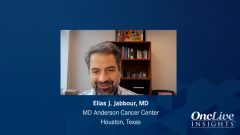
R/R B-Cell ALL: Is There a Role for Transplantation?
Discussion on the role of transplantation in the treatment of patients with relapsed/refractory B-cell acute lymphoblastic leukemia.
Episodes in this series

Elias J. Jabbour, MD: Jae, how do you send your patients to transplant? Who do you give transplants in the front line?
Jae Park, MD: As you said, the field is evolving. With more sensitive testing, such as MRD [minimal residual disease] testing, we’ll hopefully be able to better discern patients who will benefit more from transplant and patients who may not need to go to allogeneic transplant with the better immunotherapies and therapies that we have and better tools to monitor for them. Right now, transplant decisions for frontline patients are based on their presenting diagnostic. One decision is based on their cytogenetics. Patients who are hypodiploid and patients who have the 4;11 translocation or the KMT2A gene rearrangement are who we definitely consider sending to transplant even after they achieve an MRD-negative CR [complete response].
Ph [Philadelphia chromosome]-like ALL [acute lymphoblastic leukemia] is an area that I still struggle with a little. We consider them to be high risk, especially the subtype you mentioned, the CRLF2 rearrangement. But if they achieve early MRD negativity, even at days 14 and 28—which I have seen patients do—I’m not 100% convinced those patients will need to go to transplant, especially if I’m using inotuzumab or blinatumomab as part of the frontline regimen. But we don’t have such data yet, so I consider transplant, especially for younger patients in whom the Ph-like mutations tend to occur. But I’m not convinced that I need to, and I struggle with it a lot, because I’m hoping they don’t need the transplant. But we need more data to say that more definitively.
The third possibility is MRD positivity. Regardless of their presenting diagnostics and mutations, once I hopefully convert them into MRD negativity, those are patients who we consider for transplant.
Elias J. Jabbour, MD: But if you’re MRD positive at 3 months, sometimes it’s too late. I agree with you that you convert them to go for transplant. But if you’re MRD positive at cycle 1 and you can convert them earlier, you may not need to go for allotransplant.
Jae Park, MD: Those are the exact questions that we all should look at, regarding what time point is critical. One thing is that we have seen the other side. Even after they have MRD positivity, we have seen some experience from others where some may just continue the same therapy, which is probably the worst thing that you can do for those patients with MRD positivity. But you’re right about those early MRD converters: it may be too late to convert them at 3 or 4 months. Whether it will be at 1 or 2 months is something that we have to study.
Transcript edited for clarity.



































